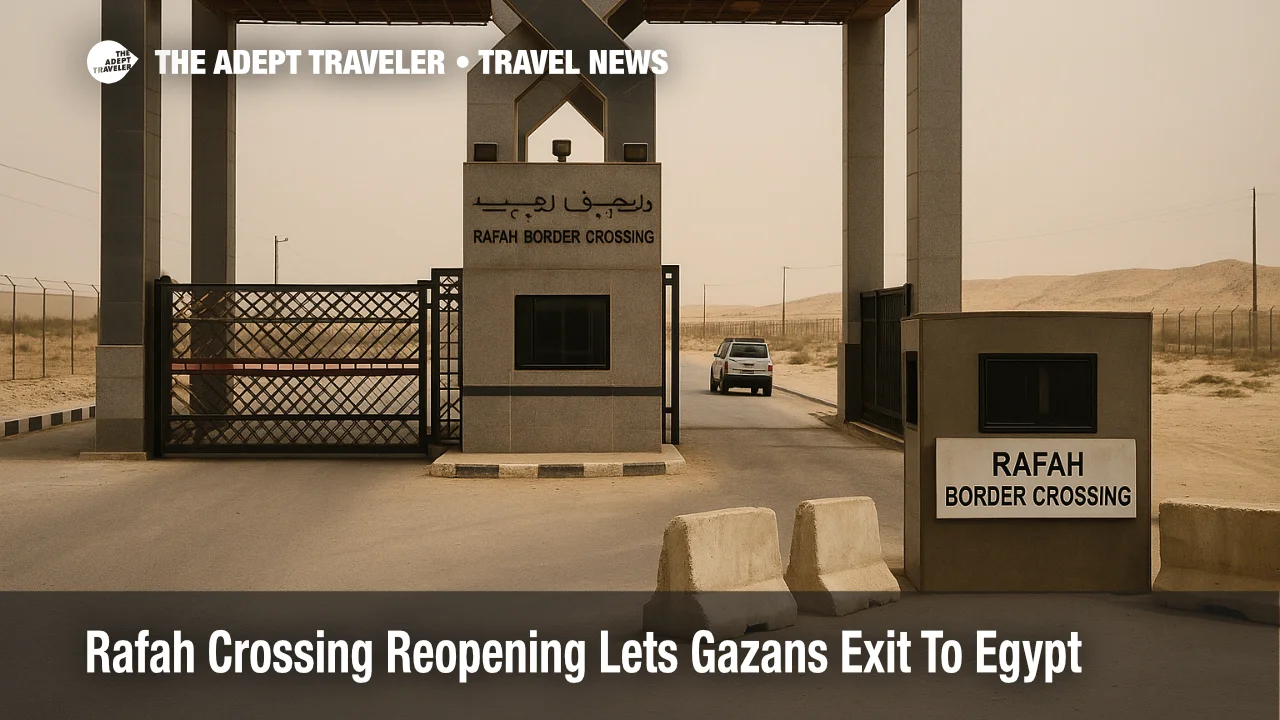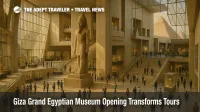Egypt
Embark on an unforgettable journey as you travel to Egypt, a land where timeless wonders and vibrant culture converge along the golden banks of the Nile River. As the sun bathes the mighty pyramids of Giza in a warm, golden glow, the scent of spices entices you through bustling bazaars, promising a taste of rich, flavorful cuisine. The gentle hum of life in Cairo envelops you, where ancient history whispers through the aged stones of towering temples and the echoes of distant calls to prayer linger on the desert breeze. From the intricate hieroglyphs that adorn ancient tombs to the warm hospitality of its people, every moment spent in Egypt is a mesmerizing dance of the senses, urging wanderers to delve deeper into its mysteries and tales as old as time. Feel the soft, cool sands beneath your feet and let the allure of Egypt captivate your spirit as you explore a place that dances elegantly between the serene and the sublime.
Egypt Travel Season
Travel to Egypt is an enchanting adventure steeped in history, culture, and remarkable landscapes. The best season for travel can significantly influence your experience, considering weather patterns and tourist influx. Egypt's peak season typically runs from October to April. During this time, the climate is pleasantly mild, making it the ideal season for travelers to explore the country’s magnificent ancient sites, such as the Pyramids of Giza and Luxor's temples, without the discomfort of Egypt's sweltering summer heat. As this is also the peak season, you can expect larger crowds at popular attractions, but the pleasant weather often compensates for the busyness.
While the period from October to April marks the peak tourist season for travel to Egypt, there are specific months within this timeframe that offer unique advantages. November and March are particularly favorable due to their combination of pleasant temperatures and more manageable crowds. Traveling during these months allows you to enjoy the natural beauty of Egypt’s landscapes and cultural experiences more intimately, and often at more competitive prices for accommodations and tours. These months are perfect for exploring the wonders of the Nile, the beaches of the Red Sea, or even a desert safari under the comfortable sun.
For those willing to brave the heat, traveling to Egypt during the off-peak summer months from May to September can be a rewarding experience. Despite the high temperatures, these months offer significant perks. Visitors can often find better deals on flights and lodging, and tourist sites are less crowded, allowing for a more personal connection with the sites. Additionally, local festivals such as the Sharm El-Sheikh International Theatre Festival and the Alexandria Summer Festival occur during these months, providing unique cultural insights.
Travel to Egypt also offers the chance to partake in its vibrant local events and festivities. For example, Ramadan, which shifts date annually based on the lunar calendar, is a holy month that can enhance your travel experience with its unique observances and evening celebrations post-sunset. Keep in mind that during Ramadan, business hours may differ, and some local establishments might operate with reduced schedules. Egypt's Coptic Christmas, celebrated on January 7th, is an essential cultural event, offering a glimpse into the country's diverse religious tapestry.
Overall, Egypt's diverse travel seasons present varied opportunities to experience its allure. Making an informed decision about when to travel will ensure that your journey is memorable, whether you seek the comfort of mild weather during the peak season or the tranquility of exploring historic sites during the off-peak months. Each season provides a unique lens through which to appreciate Egypt's timeless beauty and dynamic culture.
The Weather and Seasons in Egypt
Egypt, known for its rich historical tapestry and cultural grandeur, presents a unique climate that beckons travelers seeking diverse weather experiences. As you plan to travel to Egypt, understanding its climate variations is essential to make the most of your visit. The country's geographical stance endows it with a desert climate, characterized by hot summers, mild winters, and minimal rainfall, creating an intricate weather pattern that appeals uniquely each season.
Summer in Egypt
The Egyptian summer, running from May to September, showcases the country's renowned heat. During this period, temperatures soar, especially in regions such as Cairo, Luxor, and Aswan. Those embarking on travel to Egypt in summer can anticipate temperatures ranging from 95°F to 104°F (35°C to 40°C). While humidity remains low in the desert areas, coastal cities like Alexandria experience slightly higher humidity, offering a moderate reprieve with sea breezes. Travelers might find solace in Egypt’s Red Sea resorts, where the cooling waters and stunning beaches provide an escape from the intense heat.
Winter Wonderland in Egypt
Winter makes for the most inviting time for travel to Egypt. From October to February, the weather is predominantly mild and pleasant, with temperatures in the daytime averaging around 68°F to 77°F (20°C to 25°C). Nighttime brings cooler temperatures, dipping to about 50°F to 59°F (10°C to 15°C), especially in the desert regions. Rainfall is scarce across the country, with Alexandria and the Nile Delta seeing more precipitation than other areas, adding a refreshing contrast to the arid interior lands. This is the ideal season for exploring Egypt's extensive outdoor historical sites, such as the Pyramids of Giza or sailing down the Nile River.
Spring and Autumn Transitions
Both spring and autumn offer their unique charm for those planning travel to Egypt. The transitional seasons of March to April and September to October bring moderate temperatures and generally comfortable conditions. Travelers will enjoy average temperatures between 77°F and 86°F (25°C to 30°C), making it conducive for extensive sightseeing tours without the extremities of summer or the cool bite of winter nights. These months boast the least tourist congestion, allowing for a more relaxed and personal exploration of Egypt’s wonders.
Travelling Considerations and Events
While weather alone is often a significant factor when planning travel to Egypt, coinciding travel with local events can enhance the experience. Egypt's climate supports year-round travel opportunities, but notable festivities, like the Abu Simbel Sun Festival in February and October, are tied to specific seasonal changes, providing cultural richness amid favorable weather. Travel to Egypt during these times promises a fusion of pleasant climatic conditions and festive enthusiasm, making it an irresistible attraction for global explorers.
Accepted Payment Methods and Other Payment Information in Egypt
When embarking on a travel journey to Egypt, understanding the diverse payment options available can greatly enhance your experience. The local currency is the Egyptian Pound, abbreviated as EGP or sometimes LE for Livre Égyptienne. Familiarizing yourself with this currency is crucial, as cash transactions remain prevalent across Egypt, particularly in smaller towns and local markets.
For international travelers looking to ease their transactions, credit cards such as Visa and Mastercard are widely accepted in major cities, hotels, and high-end restaurants. American Express is less commonly accepted for travel in Egypt, and Discover is rarely an option. Tourists should always check with individual merchants regarding which credit cards they accept to avoid inconveniences during their travel to Egypt.
These credit card limitations highlight the importance of carrying some cash for smaller establishments or local transportation services where card processing might not be available. ATMs are readily available in urban areas, allowing you to withdraw Egyptian Pounds using international credit or debit cards, although it's advisable to notify your bank about your travel to Egypt to prevent any transaction issues.
Tipping, known as "bakshish" in Egypt, is customary and appreciated, particularly in the service industry. When dining out, adding a tip of around 10-15% to your bill is standard practice if a service charge isn’t included. Tipping in cash is often preferred, even in establishments that accept cards.
As you travel to Egypt, it's essential to keep small denomination notes handy for tips or purchases at places like local markets and small shops where credit card facilities might be non-existent. Additionally, haggling is a common practice in Egyptian markets, so carrying cash can sometimes help in obtaining better prices.
Being informed about the country's payment landscape can significantly ease your interactions as you travel to Egypt, ensuring a more seamless and enjoyable experience. Embracing both cash and card options while being mindful of local customs like tipping can lead to a more enriching engagement with the vibrant culture of Egypt.
Why You Should Travel to Egypt
Travelers looking to experience a rich tapestry of history and culture should travel to Egypt, where ancient history meets vibrant modernity. With a captivating blend of iconic landmarks, diverse landscapes, and warm hospitality, Egypt is a destination that offers amazing experiences for every type of traveler.
Explore the Timeless Wonders of the Pyramids
Travel to Egypt promises an awe-inspiring encounter with the Great Pyramids of Giza. These architectural marvels, standing majestically against the desert sky, are a testament to the ingenuity and ambition of ancient civilizations. Witnessing the grandeur of the pyramids and the enigmatic Sphinx, which has stood guard for thousands of years, is an experience that is both humbling and exhilarating.
Immerse Yourself in Ancient Egyptian History
Egypt is a treasure trove of historical wonders. From the sprawling temples of Luxor to the royal tombs in the Valley of the Kings, the country's ancient sites offer a glimpse into a civilization that has fascinated historians and travelers alike. The well-preserved hieroglyphics and stunning artifacts tell stories of pharaohs, gods, and epic journeys, inviting visitors to step back in time.
Enjoy the Bustling Energy of Cairo
The vibrant capital city of Cairo pulses with life and excitement. Travelers can wander through bustling bazaars, such as Khan El Khalili, where the aroma of spices fills the air, or explore world-renowned museums like the Egyptian Museum, home to treasures including those of Tutankhamun. Cairo is a city that effortlessly blends tradition with modernity.
Experience the Serene Beauty of the Nile River
The Nile River, the lifeblood of Egypt, offers a serene and picturesque backdrop for any traveler. Whether cruising its tranquil waters on a luxurious ship or experiencing it up close in a traditional felucca sailboat, the Nile delivers breathtaking views and a sense of tranquility unique to this extraordinary river.
Discover the Stunning Red Sea Riviera
For those interested in sun, sand, and underwater exploration, Egypt's Red Sea coast is a paradise. With crystal-clear waters and vibrant coral reefs, spots like Sharm El Sheikh and Hurghada offer some of the world's best diving and snorkeling opportunities, drawing marine enthusiasts from across the globe.
Wander Through the Enchanting Shaded Streets of Alexandria
Alexandria, a city that whispers tales of a storied past, invites travelers to explore its majestic libraries and relics of ancient civilizations. As a melting pot of cultures, Alexandria offers a unique blend of history, stunning coastal views, and Mediterranean culinary delights.
Witness the Majestic Desert Landscapes
The expansive deserts of Egypt are landscapes of mystique and beauty. Travelers have the chance to embark on desert safaris, explore the unique rock formations, and experience the traditional Bedouin culture. The stark beauty of the White Desert and the rolling dunes of the Great Sand Sea are destinations that captivate and inspire.
Capture the Essence of Egyptian Culture and Tradition
Travel to Egypt is incomplete without experiencing its vibrant culture and warm hospitality. Visitors can enjoy traditional music and dance, taste authentic Egyptian cuisine like koshari and ful medames, and participate in age-old festivals that celebrate the nation's rich heritage and spirit.
Uncover the Mysteries of Ancient Monasteries
Explore the mystical side of Egypt with a visit to ancient monasteries like St. Catherine's, one of the world's oldest working Christian monasteries. Nestled at the foot of Mount Sinai, these sacred sites offer a journey of spiritual and historical significance amid stunning natural beauty.
Marvel at the Iconic Temples of Abu Simbel
The colossal statues and intricately carved interiors of the temples at Abu Simbel are a highlight for any visitor to Egypt. Carved into the mountainside, these UNESCO World Heritage Sites were painstakingly relocated to avoid inundation by Lake Nasser's rising waters, showcasing the interplay of ancient artistry and modern engineering.
The History of Egypt
Egypt, a land that captivates travelers with its rich tapestry of history, offers an unparalleled journey through time for those who decide to travel to Egypt. As one of the world's oldest nation-states, Egypt's history is incredibly diverse and influential, stretching back thousands of years. Beginning with the ancient civilization renowned for the construction of monumental pyramids and the Great Sphinx of Giza, Egypt invites history lovers to explore a land where Pharaonic kings once ruled. The allure of ancient Egypt is heightened by its enduring mysteries and superb achievements in architecture and governance. The pyramids, standing majestically, are not only architectural wonders but also serve as a testament to the ingenuity and ambition of ancient Egyptian civilization, making Egypt a top destination for those yearning to uncover the past.
Another compelling aspect of Egypt's historical narrative is the Ancient Egyptians' wealth of contributions to art, writing, and religious thought. The hieroglyphs that adorn temple walls and tombs throughout the country's vast archaeological sites offer insights into a civilization that devised one of the earliest writing systems. Visitors traveling to Egypt can witness these stunning relics at the Luxor Temple and Karnak Temple complexes, which showcase intricate carvings and a legacy of religious practices that influenced subsequent cultures. Not only does this enrich a travel experience, but it also lays bare the impact that Egypt has had on shaping theological and philosophical ideas across the globe.
Following its ancient period, Egypt's historical stage saw shifts in power and cultural influence through periods of Greek, Roman, and Islamic rule. The legacy of these eras is palpable in cities like Alexandria, known for its ancient library and lighthouse, and Cairo, where Islamic architecture and culture thrive. Historically, this confluence of civilizations has turned Egypt into a mosaic of landmarks, with the Cairo Citadel and the Al-Azhar Mosque reflecting the profound Islamic contribution. The fusion of these influences has crafted a dynamic cultural landscape ensuring that your travel to Egypt is not just a journey through time but also a cultural expedition that explores humanity's fundamental social and religious developments.
Today, modern Egypt presents an intriguing blend of this ancient heritage with contemporary life. The bustling metropolises, such as Cairo, offer modern attractions alongside ancient wonders, providing travelers an option to enjoy diverse experiences, from exploring historical sites to engaging with contemporary Egyptian culture. The solid urban infrastructure supports an easy and exciting exploration, making travel in Egypt both seamless and captivating. As you wander through vibrant markets or share coffee with locals in any of the bustling city squares, you'll find that each encounter adds layers to your understanding of Egypt's complex and rich history, making it an essential destination for history enthusiasts and curious travelers alike.
The Culture of Egypt
Travel to Egypt offers an extraordinary opportunity to dive into a fascinating world where ancient history and vibrant modern life intertwine. The culture of Egypt is a tapestry woven over millennia, characterized by an extraordinary blend of antiquity and contemporary practices. Local traditions in Egypt are deeply rooted in religion and history; Islam is the predominant faith, and it significantly influences daily life and customs. This is vividly reflected in the call to prayer resonating from minarets five times a day, guiding the rhythm of life across cities and villages. Yet, Egypt is also home to a significant Christian minority, the Copts, whose ancient practices add to the cultural mosaic. Travelers can experience the warm hospitality that Egyptians are famous for, with generous offers of tea and invitations into homes—a testament to their welcoming nature.
Festivals in Egypt are captivating events that enliven its rich cultural calendar. The celebration of Ramadan, followed by the joyous feast of Eid al-Fitr, is marked by a spirit of family, community, and charity. The streets of Cairo, Alexandria, and other cities come alive with late-night festivities as people break their fast with family meals and traditional sweets. The annual spring festival, Sham El-Nessim, is another unique event where Egyptians of all faiths gather to enjoy picnics in parks and by the Nile, continuing a Pharaonic tradition that heralds the arrival of spring. These festivals are not just celebrations; they are living, breathing narratives of Egypt's diverse cultural history.
Art and cultural expressions are pivotal to the Egyptian identity, showcasing both the continuance and evolution of traditions. Traditional music, deeply ingrained in Egyptian culture, features classical instruments like the oud and qanun, captivating listeners with their melodic richness. Contemporary Egyptian music also thrives, marrying Western influences with traditional sounds. Egyptian dance, including the famous belly dance, is both a cultural expression and a form of entertainment that captivates audiences around the world. Additionally, Egypt's thriving art scene can be witnessed in the bustling galleries of Cairo and Alexandria, where modern and ancient artistry coalesce to portray the myriad stories of Egypt.
The multicultural essence of Egypt is a remarkable facet that enhances its cultural experience. Urban areas, in particular, reveal a diversity born of historical conquests, trade, and migration. For those traveling to Egypt, this multicultural atmosphere provides a dynamic experience that reflects in food, language, and customs, creating a rich cultural dialogue that is both unique and inviting. Efforts are also ongoing to preserve indigenous cultures, especially the Nubian heritage, preserving traditional crafts, language, and architecture for future generations. Travel to Egypt not only promises an immersion in its vast historical landscapes but also invites an exploration of its living, ever-evolving cultural heart, offering an experience unlike any other.
The Culinary Experience of Egypt
Travelers venturing into the rich cultural tapestry of Egypt are in for a culinary adventure that is as multifaceted as the country's ancient past and vibrant present. Egyptian cuisine is a delightful fusion of Mediterranean, Middle Eastern, and African influences, reflecting the diverse history of the region. When you travel to Egypt, you'll find that food is not just about nourishment; it's a celebration of life, family, and tradition. Traditional dishes like koshari, a hearty mix of rice, pasta, lentils, and chickpeas topped with a spicy tomato sauce, or the iconic ful medames, a savory stew of fava beans enjoyed from the time of the Pharaohs, are a testament to Egypt's ability to transform simple ingredients into savory masterpieces.
Must-Try Dishes and Unique Beverages
Among the must-try dishes when you travel to Egypt are molokhia, a soup made from jute leaves that offers a unique plant-like flavor, and fattah, a celebratory dish of rice and crispy bread soaked in garlic vinegar sauce and topped with spiced meat. These dishes underscore the importance of communal dining in Egyptian culture, often being served during festive gatherings and special occasions. To accompany these flavorful dishes, try local beverages like the tangy and refreshing hibiscus tea known as karkade, or sample Egyptian wines from vineyards along the Nile Delta, which produce whites, reds, and rosés that pair beautifully with local flavors. While Egypt is predominantly a Muslim country, local beers like Sakara and Stella are available for those interested in trying regional brews.
Dining Experiences and Culinary Traditions
Travel to Egypt isn't complete without immersing yourself in its bustling food markets, where the scent of freshly baked bread, tangy pickles, and spicy kebabs fill the air. Street food is deeply embedded in Egyptian culture; don’t miss out on savoring a classic taameya, the Egyptian falafel made with fava beans instead of chickpeas that gives it a distinct flavor. For a more refined dining experience, Cairo and Alexandria offer fine dining restaurants that blend authentic Egyptian flavors with contemporary culinary techniques. Culinary traditions in Egypt often revolve around sharing; meals are usually served in large platters from which everyone helps themselves, echoing the values of hospitality and community that are integral to Egyptian society.
Food Festivals and Dietary Options
Regional food festivals are another highlight for those who travel to Egypt, with events such as the Cairo Food Festival showcasing the nation's diverse culinary scene and inviting locals and visitors to indulge in a variety of dishes. Seasonal dishes, such as feseekh, a fermented fish delicacy traditionally eaten during Sham El-Nessim, indicate the unique way Egyptians celebrate their cultural and seasonal occasions with distinct flavors. Egypt is also accommodating to different dietary preferences, offering a variety of vegan and vegetarian options, as many traditional dishes naturally feature legumes and vegetables. For those with dietary restrictions, a travel to Egypt ensures a pleasurable journey through its culinary landscape without compromise.
What to See and Do in Egypt
When you travel to Egypt, one of the most awe-inspiring experiences is exploring the Great Pyramids of Giza. Standing tall on the Giza Plateau, these ancient wonders capture the essence of Egypt, towering against the backdrop of the desert sky. Each block of stone seems to whisper the stories of pharaohs and ancient civilizations, making it an intriguing spot for both history enthusiasts and curious travelers alike.
The Timeless Wonder of Ancient Thebes
In the heart of Egypt's modern city Luxor, travelers can step back in time at the Karnak Temple Complex. This sprawling temple is not just a singular monument but a mesmerizing collection of sanctuaries, pylons, and obelisks. As you wander through the monumental ruins, feel the echo of ancient processions and imagine the lives of the Ancient Egyptians who once thronged its halls.
The Charmed Waters of Nile River Cruises
Sailing down the Nile River unlocks the mysteries of Egypt in a way that few other experiences can. A cruise allows you access to both world-renowned monuments and lesser-known sites along the riverbanks, presenting Egypt's history as it has been for thousands of years. Families and couples can enjoy leisurely paced tours that combine relaxation with adventure, as you float past lush landscapes and quaint villages.
The Eclectic Scene of Cairo’s Khan El Khalili Bazaar
While your travel to Egypt wouldn't be complete without seeing its majestic pyramids and temples, it is the bustling vibe of Khan El Khalili Bazaar in Cairo that lets you plunge into the local culture. Lose yourself in narrow winding streets filled with the calls of vendors and the scents of spices. This vibrant marketplace offers everything from handcrafted souvenirs to traditional dishes, making it a perfect destination for solo travelers seeking to soak up authentic Egyptian life.
The Splendor of Abu Simbel’s Ancient Colossi
Journey to the southern reaches of Egypt to discover the grandeur of the Abu Simbel temples. These massive rock-cut temples were constructed under the reign of Pharaoh Ramses II, and their interiors are a testament to ancient art and architecture. The colossal statues flanking the entrance will leave you breathless, and witnessing the sun alignment twice a year is an indescribable experience for any traveler, whether visiting with family or friends.
The Untamed Beauty of the White Desert
For adventure seekers, venturing into Egypt's White Desert offers an otherworldly escape. The desert is famous for its wind-sculpted chalk formations, which create a surreal, lunar landscape. An overnight camping trip allows you the chance to view the luminous formations under the starlit sky. This unconventional site is as captivating as it is solitary, attracting solo travelers keen on experiencing a different side of Egypt.
The Hidden Treasures of Dahab
Egypt's Red Sea coast beckons water lovers to experience its vibrant underwater world. Dahab is an ideal base for both snorkeling and diving, known for its clear waters and flourishing coral reefs. More laid-back than other resorts like Sharm El Sheikh, Dahab invites families and adventure seekers to explore its marine life or simply relax by the beach.
The Majestic Mummies of the Egyptian Museum
Cairo’s Egyptian Museum holds treasures that offer endless fascination. Among its vast collection of artifacts, the Royal Mummy Room provides an unprecedented look into Egypt's past rulers. Each exhibit is rich with history, from the intricate sarcophagi to the mummified remains of pharaohs. This is a must-visit for anyone wishing to grasp the depth of Egypt's historical narrative during their travel to Egypt.
The Spiritual Reverence of the Coptic Cairo
Exploring the Coptic district of Cairo adds a unique spiritual dimension to your journey. The area is home to some of the oldest Christian churches in Egypt, with the Hanging Church being one of its jewels. Travelers can admire its captivating architecture and immerse themselves in the layers of history which reveal a different, earlier facet of Egypt beyond the allure of its ancient polytheistic past.
The Captivating Seas of Alexandria’s Mediterranean Coast
Visit Alexandria, where the Mediterranean meets Egyptian soil, offering a lively contrast to the ancient desert landscapes. The city presents a mélange of Greco-Roman and Egyptian influences, epitomized by its illustrious library and the remnants of its historic harbor. Families can wander along the picturesque Corniche, taking in both the modern bustling cafes and the quaint charm of this storied city by the sea.
Tips & Tricks for Traveling in Egypt
Travel to Egypt offers a mesmerizing journey through time, encapsulating the rich history, stunning landscapes, and vibrant culture that the country is famous for. However, to fully enjoy and immerse yourself in the experience, there are several tips to keep in mind that can enhance your overall trip. From understanding local customs to navigating transportation, here's a comprehensive guide to making the most of your Egyptian adventure.
Understand Local Customs and Etiquette
When you travel to Egypt, being aware of local customs and etiquette is crucial. Egyptians are known for their hospitality, but it is important to respect their cultural norms. Public displays of affection are generally frowned upon, and when visiting religious sites, it’s vital to dress modestly. For women, this might mean covering your shoulders and knees, and carrying a scarf for covering your head can be useful when entering mosques. Always remove your shoes when entering someone’s home or a mosque, as a sign of respect.
Optimize Your Itinerary for Major Sights
When visiting popular tourist attractions such as the pyramids of Giza, Luxor Temples, or the Karnak Temple, try to organize your schedule to visit early in the morning or late in the afternoon. These times are not only cooler, but also less crowded, allowing you to enjoy the sites with fewer tourists around. Consider purchasing the Cairo Pass and Luxor Pass if you plan to visit several archaeological sites; these passes can save you money and streamline entry processes.
Explore Egypt’s Local Cuisine
Part of the allure of travel to Egypt is its unique culinary offerings. Be sure to try traditional dishes like ful medames, koshari, and molokhia. Street food is delicious and generally safe, but aim to eat at vendors that are busy with locals, as this ensures a higher turnover of fresh food. For a truly authentic experience, don't hesitate to ask locals for restaurant recommendations.
Master the Art of Bargaining
Bargaining is a common practice in Egyptian markets and bazaars, including the famous Khan el-Khalili. While it might seem intimidating, enjoy the process and view it as a friendly interaction rather than a confrontation. Start by offering half the initial price and then negotiate to a middle ground. Always remain polite and willing to walk away if the price doesn’t fit your budget.
Secure Safe and Affordable Transportation
Transportation in Egypt can be a significant part of your travel experience. While taxis are widely available, make sure you agree on a price before setting off. Consider using ride-sharing apps like Uber and Careem for greater price transparency and convenience. If you’re exploring Cairo, the metro is a cheap and efficient way to avoid traffic and cover distances quickly, especially during rush hours.
Stay Connected with a Local SIM Card
To stay connected during your travel to Egypt, consider purchasing a local SIM card upon arrival. Providers such as Vodafone, Orange, and Etisalat offer various prepaid options that include data, calls, and texts at reasonable prices. Having a local number can be incredibly handy for navigation, communication, and booking transportation on-the-go.
Stay Safe with Travel Insurance
Ensuring you have comprehensive travel insurance is vital for any trip, including travel to Egypt. This will provide you peace of mind in the event of unexpected health issues or incidents. Be sure to choose coverage that includes medical expenses, evacuation, and trip cancellation. Keep digital and hard copies of your insurance policy and emergency contact numbers readily accessible throughout your trip.
Choose the Right Time to Visit
Egypt’s weather can vary significantly, and the best time to travel to Egypt is from October to April when temperatures are cooler, making it more comfortable for sightseeing. Avoid the summer months, especially if you plan to visit the southern areas of Aswan and Luxor, as the heat can be extreme.
Capture Perfect Shots as a Photographer
Travel to Egypt offers numerous photography opportunities, from the majestic pyramids to bustling markets. To avoid harsh shadows and capture vibrant colors, aim to shoot during golden hours around sunrise and sunset. Use a polarizing filter to reduce glare and enhance the sky’s color, especially when photographing the Nile or vast desert landscapes. Research and plan your shots, but also be open to spontaneous moments that capture Egypt's spirit and character.
Prioritize Health and Hydration
Hydration is key when you travel to Egypt, as the climate can be dry and hot, especially if you're visiting desert areas. Carry a reusable water bottle and refill it with filtered water when possible. Exercise caution with street food until your body adjusts, and consider bringing medications for common ailments such as stomach upset. Always apply sunscreen liberally and wear a hat and sunglasses to protect yourself from the strong sun.
What To Know Before You Go to Egypt
Before embarking on your travel to Egypt, understanding the entry requirements is crucial to ensure a smooth journey. Travelers should check whether they need a visa to enter Egypt. Citizens from many countries can obtain a visa on arrival at Egyptian airports for a stay up to 30 days, but it's recommended to confirm current regulations with Egyptian consulates, as policies may vary. For longer stays or specific purposes such as work, different visa types may be required.
Another essential aspect to consider when planning travel to Egypt is health precautions. While there are no mandatory vaccinations for entry, travelers are advised to be up-to-date on routine vaccines such as measles, mumps, and influenza. The Centers for Disease Control and Prevention (CDC) advises travelers to consider vaccinations for Hepatitis A, Typhoid, and others if traveling to rural areas or planning extended stays. Moreover, comprehensive travel insurance is recommended to cover any unforeseen medical expenses while you are in Egypt.
Local Customs and Etiquette
Understanding the local customs and etiquette in Egypt is vital to ensure respectful interactions. Egypt is predominantly a Muslim country, which influences cultural norms and practices. Dressing modestly is appreciated, especially in rural areas and religious sites. Public displays of affection are discouraged and should be kept to a minimum.
Photography near military establishments is prohibited, and travelers should always ask for permission before photographing people, particularly women. Egyptians are known for their hospitality, and it's customary to offer guests refreshments, which it is polite to accept.
Transportation Options
When it comes to getting around during your travel to Egypt, there are several transportation options. Egypt has an extensive public transportation network, including buses, trains, and the Cairo Metro, which is affordable and efficient for travel within the city. Taxis and ride-sharing services like Uber are widely available in urban areas, although prices should be agreed upon beforehand if using regular taxis.
For intercity travel, trains connect major cities like Cairo, Alexandria, and Aswan, providing a scenic and comfortable travel option. Domestic flights are also available for those looking to save time, especially when traveling long distances, such as between Cairo and Luxor or Sharm El Sheikh.
Tipping Culture
Tipping in Egypt, known as "baksheesh," is a common practice and expected in many situations. Tipping is customary for service workers such as hotel staff, guides, drivers, and restaurant staff. The amount varies, but for restaurants, a tip of 10-15% of the bill is standard. Smaller tips are usually given to hotel staff and other service providers.
Common Phrases and Communication Tips
While Arabic is the official language in Egypt, many people, especially in the tourism sector, speak English. However, learning a few basic Arabic phrases can enhance your travel experience in Egypt. Common phrases include "Salam" (Hello), "Shukran" (Thank you), and "Min Fadlak" (Please). Such efforts are appreciated by locals and can often lead to more welcoming interactions.
For those unfamiliar with the local language, carrying a phrasebook or using a translation app can greatly assist in communication. Additionally, non-verbal gestures such as nodding or smiling can convey friendliness and respect.
With this knowledge in hand, travelers can confidently prepare for their journey, ensuring a memorable and enriching travel to Egypt experience, embracing the rich history, vibrant culture, and stunning landscapes this fascinating country offers.
Accessibility in Egypt
Egypt, a land of rich history and cultural significance, is a bucket-list destination for many. For travelers planning to explore Egypt, considerations about accessibility are crucial, especially for those with specific mobility, visual, or auditory needs. As accessibility improvements steadily progress, understanding the current landscape of travel to Egypt helps ensure a comfortable and memorable journey for all visitors.
Physical Accessibility for Travelers with Mobility Needs
When it comes to physical accessibility, Egypt is gradually adapting to accommodate travelers with limited mobility or those using wheelchairs. Larger cities such as Cairo and Alexandria feature more modern infrastructure, making them somewhat more accommodating compared to rural or historical areas. Hotels, especially international chains, often have accessible rooms equipped with necessary amenities like roll-in showers and grab bars. However, it is advisable to confirm these details with the hotel prior to booking to ensure that specific needs are met during your travel to Egypt.
Prominent tourist attractions such as the Pyramids of Giza and certain museums are making strides in accessibility. The Egyptian government and several private organizations have initiated programs to enhance access for travelers with mobility challenges. While visiting the Pyramids, for instance, special paths and ramps have been introduced to aid navigation. Although these efforts are still ongoing, the aim is to make the experience more inclusive for all tourists.
Accessible Public Transportation in Egypt
Public transportation in Egypt, while improving, presents mixed accessibility. Metro systems in Cairo are being upgraded, with newer lines implementing elevators and ramps at various stations. Buses often lack these facilities, which may pose challenges. For more convenient travel across Egypt, private transportation services such as adapted taxis and chauffeur-driven cars may be a better option. These services can be pre-arranged and may provide more comfort and ease for travelers requiring assistance.
Visual and Auditory Accommodations
While Egypt has room for improvement in visual and auditory accessibility, certain steps have been made to aid visitors. Larger tourism sites and museums offer audio guides, which provide detailed explanations to enhance the visitor experience. For those requiring sign language services, it's advisable to check in advance, as availability might be limited. Some hotels may offer visual aids, such as tactile signage or large print menus, to accommodate those with visual impairments. Efforts continue towards enhancing these services to better serve travelers with specific needs.
Accessible Tourist Attractions and Areas
As cultural heritage plays a central role in travel to Egypt, ensuring its accessibility is a focal area for many operators. Apart from the Pyramids, the Egyptian Museum in Cairo has taken initiatives to improve accessibility through guided tours tailored to visitors with disabilities. Moreover, the Khan El Khalili bazaar can be navigated more easily with assistance, though some areas might be challenging due to narrow alleys and cobbled streets. It's helpful for travelers requiring assistance to plan visits with guidance from local experts or tour operators specializing in accessible travel.
Travel to Egypt offers numerous possibilities for exploring its extraordinary attractions, but understanding the nuances of accessibility can significantly enhance the experience of travelers with diverse needs. As Egypt continues to work towards inclusivity, staying informed of available amenities and making suitable preparations ensures a fulfilling adventure in this historic land.
Health & Safety in Egypt
When planning to travel to Egypt, understanding the various safety concerns is essential for ensuring a safe and enjoyable journey. Egypt offers a rich tapestry of history and culture, attracting travelers worldwide. However, like any other destination, it presents specific challenges and requires appropriate precautions.
Water Safety
Water safety is an important consideration when traveling to Egypt. Visitors are advised to avoid drinking tap water and instead opt for bottled water, which is widely available. It's also wise to be cautious with foods rinsed with tap water, such as salads or fruits. Travelers can protect themselves by choosing peeled fruits and cooked vegetables, and ensuring they consume only purified water.
Natural Disaster Risks
Egypt experiences minimal natural disaster risks. While the region can occasionally experience mild earthquakes, significant events are rare. However, travelers should remain aware of local news and updates from reliable sources while in the country to stay informed of any potential changes or risks during their travel to Egypt.
Crime and Pickpocketing
When travelling to Egypt, crime such as pickpocketing and theft are concerns, particularly in crowded areas like markets and tourist sites. Travelers should exercise caution by keeping personal belongings secure, using money belts, and staying vigilant in crowded areas. It's advisable to avoid carrying large amounts of cash and to store valuables, such as passports and electronics, in hotel safes wherever possible.
Political and Social Unrest
Egypt has experienced periods of political and social unrest that travelers should be aware of. While major tourist areas are generally safe, it's important to stay informed about current events by following travel advisories issued by your government and registering with your embassy when traveling to Egypt. Travelers are encouraged to stay away from large gatherings or demonstrations.
Health and Safety Precautions
Access to healthcare in Egypt can vary, with private clinics and hospitals generally offering better facilities than public ones. It is essential for travelers to purchase travel insurance that includes health coverage. As for vaccinations, it is recommended to check with a healthcare provider well before departure to ensure all routine vaccines are up to date, along with any additional vaccines recommended for travel to Egypt, such as Hepatitis A, Hepatitis B, and Typhoid.
Other Places You Might Like
Petra, Jordan - Petra, famously known as the Rose City, is a breathtaking archaeological city in southern Jordan. Those who love travel to Egypt will find a kindred spirit in this wondrous place. Like Egypt’s majestic pyramids, Petra's allure lies in its ancient mystique and grandiose architectural marvels carved directly into vibrant rose-colored cliffs. Exploring Petra invites adventure travelers to wander through the Siq, a narrow gorge leading to the iconic Treasury, which echoes the intricate artistry seen in Egyptian monuments.
Marrakech, Morocco - For travel enthusiasts who dream about Egypt’s vibrant bazaars and historic sites, Marrakech is an enchanting city that captivates the senses. From the bustling souks of the Medina to the historic Kasbah, the city offers a rich tapestry of culture and history. Visitors can explore the Jardin Majorelle or the Bahia Palace, reminiscent of the lush gardens and grandiose palaces found in Egypt. Marrakech’s blend of Arab, Berber, and French influences will appeal to those who have enjoyed traveling through Egypt and exploring its cultural diversity.
Masada, Israel - Masada is a site of ancient palaces and fortresses located atop a rock plateau overlooking the Dead Sea. It offers spectacular views and a profound sense of history, akin to the panoramic vistas and historical depth found when traveling through Egyptian landscapes. This UNESCO World Heritage Site embodies the resilience and legacy of ancient civilizations, making it an ideal location for those who appreciated the historical richness during their travels to Egypt.
Luxor, Egypt - While still in Egypt, Luxor earns its place with its monumental temples and tombs of the Pharaohs. The city is often referred to as the world’s greatest open-air museum, drawing travelers who crave further insight into Egypt’s ancient history. Visitors can explore the Valley of the Kings, Karnak Temple, and Luxor Temple, experiencing the impressive preservation of history that rivals any landmark. The sheer scale and grandeur of Luxor’s ancient sites are an irresistible continuation for any Egypt travel enthusiast.
Persepolis, Iran - Regarded as one of ancient Persia's most glimmering jewels, Persepolis holds a regal splendor comparable to many historic Egyptian cities. Travelers passionate about Egypt's monumental past will be enchanted by this ancient city, with its grand palaces and ceremonial complexes reminiscent of Egyptian temples in their scale and intricacy. The reliefs depicting Syrian, Babylonian, and Egyptian influences merge into the captivating heritage of this once-thriving capital of the Achaemenid Empire.
Fez, Morocco - For those who revel in the chaos and color of Egyptian markets, Fez offers a maze of medinas filled with vibrant life and history. As one of the oldest cities in Morocco, Fez invites travelers on a sensory journey through its narrow alleys, which house artisan workshops, aromatic spices, and vibrant dye vats. The city is a microcosm of cultural experiences, with legendary sites that transport visitors into a bygone era, similar to any Egyptian escapade.
Byblos, Lebanon - As one of the oldest continually inhabited cities in the world, Byblos provides a historical depth that those who love travel to Egypt will find deeply engaging. Renowned for its archeological sites, Byblos showcases ancient ruins, including Phoenician, Roman, and Crusader remains, paralleling the layered history found in Egyptian sites. Exploring the city's old souks and the scenic harbor mirrors the same blend of history, culture, and commerce that has captivated countless travelers to Egypt.
Final Thoughts
Travel to Egypt, and you'll find yourself immersed in a world where history and modernity intertwine seamlessly. From the majestic pyramids of Giza standing as testaments to ancient ingenuity, to the bustling streets of Cairo filled with vibrant markets and enchanting aromas, Egypt offers a kaleidoscope of experiences that cater to every type of traveler. The allure of Egypt extends beyond its iconic landmarks, drawing visitors into a rich tapestry of culture, art, and cuisine, making it an unforgettable destination.
Embarking on a journey to Egypt is not just about witnessing its legendary sights; it's about connecting with the warmth of its people and the stories that echo across millennia. Whether you're exploring the serene landscapes of the Nile River or discovering the hidden treasures of the Red Sea, the diversity of experiences in Egypt is bound to captivate your senses. Travelers seeking both adventure and tranquility will find Egypt to be an enchanting crossroad where the ancient world coexists gracefully with the contemporary.
The irresistible charm of Egypt beckons those who desire a travel experience that transcends the ordinary. With its unparalleled blend of historical wonders, stunning natural beauty, and hospitable spirit, Egypt is a destination that should be on every traveler's bucket list. So as you plan your next adventure, consider the captivating call of Egypt—it promises a journey that will resonate with you long after you've returned home.
Abu Qir Bay, Egypt

Alexandria, Egypt

Aswan, Egypt

Cairo, Egypt

El Gouna, Egypt

Giza, Egypt

Luxor, Egypt

Pyramids of Egypt

Safaga, Egypt

Sharm El-Sheikh, Egypt

Valley of the Kings, Egypt

Iran NOTAM Launch Window Triggers Middle East Reroutes

Hotel Indigo Cairo New Capital Set for 2033 Opening

Iran NOTAM Rocket Launch Window Disrupts Overflights

ATTA 2026 Africa Travel Trends Report Highlights

Mandarin Oriental Nile Cruise Plans Luxor, Aswan

KLM Tel Aviv Flights Resume Via Amsterdam Feb 2026

Smithsonian Journeys 2027 Solar Eclipse Trips in Spain

Middle East Airspace Detours Extend Europe Asia Flights

Suez Canal Route Risk Hits Red Sea Cruises

Iran Airspace Closure Reroutes Flights, Delay Risk Grows

Iran Iraq Overflight Avoidance Extends Flight Times

RateHawk 2025 Booking Trends: Italy, Japan Lead

Egypt Nile E-Bike Tour Launches Feb 2026 Departures

Aden Airport Closure Disrupts Yemen Flights

Storm Byron Israel Flooding Risk For December Trips

Red Sea Piracy And Slow Suez Return Keep Cruises Wary

Nile Seray Nile Cruises Open For October 2026

Rafah Crossing Reopening Lets Gazans Exit To Egypt

2027 Mediterranean Season Adds Egypt Yacht Voyages

Red Sea Security Reroutes 2026 World Cruises

Red Sea Tensions Delay Saudi Arabia Cruise Season

Giza Grand Egyptian Museum Opening Transforms Tours

Egypt Nile Riverboat Launch Adds Luxury Ship In 2028

Regional Airline Cancellations Hit African Hubs

Oman Air Grounds Jets As Supply Chain Crunch Hits Schedules

